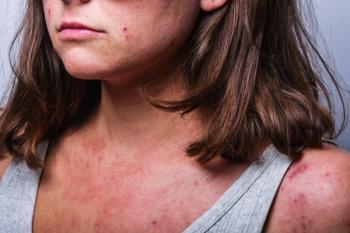Subscribe to Contemporary Pediatrics!
Interested in receiving a copy of the Contemporary Pediatrics journal every issue?
Want to stay up to date with pediatric news? Subscribe to the Contemporary Pediatrics e-newsletter to receive emailed updates regarding new data, pediatric clinical trials, puzzler cases, FDA news, and much more.
You can also follow us on LinkedIn, X, Facebook, and Blue Sky.
Thank you for visiting the Contemporary Pediatrics® website. Take a look at some of our top stories from the week (Monday, September 8, to Friday, September 12, 2025), and click on each link to read and watch anything you may have missed.
Can you diagnose this infant with neonatal respiratory distress?
The Case
A 32 weeks and 6/7 days, 1970 g infant was born via meconium-stained vaginal delivery to a 37-year-old G2P1 mother who recently immigrated from India. The mother presented with preterm premature rupture of membranes (PPROM) for 11 hours prior to eventual vaginal delivery.
Maternal history was otherwise notable for rubella nonimmune, advanced maternal age, and a prior history of intrauterine fetal demise 4 years prior. Prior to delivery, the mother received 1 dose of ampicillin given unknown Group B streptococcus (GBS) status, and a single dose of betamethasone to accelerate fetal lung maturity.
After delivery, the infant was vigorous with delayed cord clamping of 1 minute. The Apgar scores were 8 and 8 at 1 and 5 minutes of life, respectively. There was mildly increased respiratory effort in the delivery room for which CPAP respiratory support was begun. The child was brought to the NICU on CPAP 5, 30% FiO2.
Click here to take our puzzler poll, and try to diagnose this patient.
Pneumococcal 21-valent conjugate vaccine demonstrates immune response in children 2 to <18 years
On September 11, 2025, Merck reported positive phase 3 STRIDE-13 trial results for its 21-valent pneumococcal conjugate vaccine (CAPVAXIVE) in children ages 2 to <18 years. The vaccine generated immune responses across all 21 serotypes and was noninferior to PPSV23 for the 12 shared serotypes, while showing superiority for the 9 unique ones.
Safety findings were consistent between groups, though injection-site reactions were more common with CAPVAXIVE. Investigators noted the vaccine’s potential to expand protection for children and adolescents, particularly those with chronic conditions, beyond current pneumococcal regimens. Merck stated these results, representing the final STRIDE program readout, will be submitted to regulators worldwide.
Click here for full announcement details.
Neffy demonstrates positive, real-world data for anaphylaxis
ARS Pharmaceuticals announced real-world evidence supporting the effectiveness of neffy, a needle-free epinephrine nasal spray, in treating anaphylaxis during oral food challenges or allergen immunotherapy, according to Annals of Allergy, Asthma & Immunology. In an analysis of 545 patients, 89.2% achieved symptom resolution with a single dose, mirroring historical success rates for intramuscular epinephrine.
First approved in 2024 for children weighing at least 66 lbs and expanded in 2025 to patients aged 4 years and older, neffy offers a needle-free alternative designed to address barriers such as needle phobia or incorrect auto-injector use. The findings align with prior clinical trials, including a phase 3 study where all 15 participants responded to a single dose, supporting neffy’s clinical interchangeability with traditional epinephrine injections and reinforcing its role as a viable, accessible treatment for life-threatening allergic reactions.
Click here for more.
Ji-Hyun Lee, MD, discusses neurodevelopmental risk after anesthesia in infants
Preliminary results from a randomized clinical trial suggest that brief exposure to inhaled anesthesia during surgery does not cause adverse short-term neurodevelopmental effects in infants and young children, according to findings published in Anesthesiology.1
The study, led by Ji-Hyun Lee, MD, PhD, of Seoul National University Hospital, evaluated 400 children under 2 years of age who underwent surgery lasting less than 90 minutes. Participants were randomly assigned to receive either sevoflurane alone or a “balanced” regimen designed to lower sevoflurane exposure through the addition of intravenous dexmedetomidine and remifentanil.
In a written Q+A with Contemporary Pediatrics, study author Ji-Hyun Lee, MD, PhD, explains findings and implications of the study.
Click here to read the Q+A.
COVID-19 era toddlers had lower emotional, behavioral problems
A new multicenter study published in JAMA Network Open suggests that toddlers showed resilience during the COVID-19 pandemic, with slightly fewer emotional and behavioral problems compared with prepandemic peers. Researchers analyzed data from 3,438 children (average age 2 years) across nine U.S. and Puerto Rico sites, using the Preschool Child Behavior Checklist to assess internalizing and externalizing symptoms.
Pandemic-exposed toddlers had modestly lower internalizing scores (1.5–2 points) and externalizing scores (1.7–3.2 points) than children assessed before March 2020, with stronger effects observed among children of mothers without a bachelor’s degree. The findings indicate that certain within-home factors, such as stable routines or positive parental coping strategies, may have buffered young children from behavioral challenges, highlighting opportunities for resilience even amid widespread disruption.
Click here for full study details.







